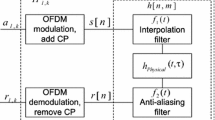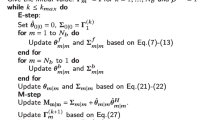Abstract
Orthogonal frequency-division multiplexing (OFDM) is a multi-carrier modulation scheme that has been employed in many communication standards. The performance of OFDM is severely degraded by the presence of impulsive noise caused due to different nonlinear devices and power amplifiers. In this paper, we propose a novel automated framework to detect and remove impulse noise in OFDM system. The proposed method is based on sparse decomposition and \(l_1\)-norm optimization algorithm of the received signal over an over-complete matrix composed of both sine and cosine waveforms and time-shifted impulse waveforms. By proper construction of the over-complete matrix, the impulse removal and symbol decoding have been performed simultaneously. Thus, it can reduce the computational complexity. Our method does not require any assumption about the location and magnitude of the impulse and does not demand pilot symbols or null subcarriers unlike other existing methods. Thus, the proposed method is blind in nature. The method is evaluated using different levels of impulse noise and signal-to-noise ratios varying from 0 to 20 dB. Preliminary evaluation results demonstrate the effectiveness of the sparse representation with the proposed dictionaries in effectively removing the impulse noise and improving the bit error rate under different noise levels.









Similar content being viewed by others
References
F. Abdelkefi, P. Duhamel, F. Alberge, Impulsive noise cancellation in multicarrier transmission. IEEE Trans. Commun. 53(1), 94–106 (2005)
M. Aharon, M. Elad, A. Bruckstein, K-SVD: an algorithm for designing over-complete dictionaries for sparse representation. IEEE Trans. Signal Process. 54(11), 4311–4322 (2006)
T.Y. Al-Naffouri, A.A. Quadeer, G. Caire, Impulse noise estimation and removal for OFDM systems. IEEE Trans. Commun. 62(3), 976–989 (2014)
T.Y. Al-Naffouri, A.A. Quadeer, F.F. Al-Shaalan, H. Hmida, Impulsive noise estimation and cancellation in DSL using compressive sampling, in IEEE International Symposium on Circuits and Systems (ISCAS), pp. 2133–2136 (2011)
K.L. Blackard, T.S. Rappaport, C.W. Bostian, Measurements and models of radio frequency impulsive noise for indoor wireless communications. IEEE J. Sel. Areas Commun. 11(7), 991–1001 (1993)
R. Boden, Real-time ARQ protocol for improved impulsive noise robustness of ADSL systems, in Next Generation Internet Networks, pp. 40–47 (2007)
G. Caire, T.Y. Al-Naffouri, A.K. Narayanan, Impulse noise cancellation in OFDM: an application of compressed sensing, in IEEE International Symposium on Information Theory (ISIT), pp. 1293–1297 (2008)
M. Ghosh, Analysis of the effect of impulse noise on multi-carrier and single carrier QAM systems. IEEE Trans. Commun. 44(2), 145–147 (1996)
T. Hirakawa, M. Fujii, M. Itami, K. Itoh, A study on iterative impulse noise reduction in OFDM signal by recovering time domain samples, in IEEE International Symposium on Power Line Communication and Its Applications, pp. 325–330 (2006)
T. Hwang, C. Yang, G. Wu, S. Li, G.Y. Li, OFDM and its wireless applications: a survey. IEEE Trans. Veh. Technol. 58, 1673–1694 (2009)
J. Jia, J. Meng, A dual protection scheme for impulsive noise suppression in OFDM systems. Int. J. Electron. Commun. (AEU) 68, 51–58 (2014)
F.H. Juwono, Q. Guo, D. Huang, K.P. Wong, L. Xu, Impulsive noise detection in PLC with smoothed L0 norm, in IEEE International Conference on Acoustics, Speech and Signal Processing (ICASSP 2015), pp. 3232–3236 (2015)
L. Lampe, Bursty impulsive noise detection by compressed sensing in IEEE International Symposium on Power Line Communications and Its Applications (2011)
A. Maneerung, S. Sittichivapak, K. Hongesombut, Application of power line communication with OFDM to smart grid system, in 8th International Conference on Fuzzy Systems and Knowledge Discovery, vol. 4 (2011)
M.S. Manikandan, S. Samantaray, I. Kamwa, Detection and classification of power quality disturbances using sparse signal decomposition on hybrid dictionaries. IEEE Trans. Instrum. Meas. 64(1), 27–38 (2015)
H. Matsuo, D. Umehara, M. Kawai, Y. Morihim, An iterative detection scheme for OFDM over impulsive noise channels, in International Symposium on Powerline Communications (2002)
D. Middleton, Statistical-physical models of electromagnetic interference. IEEE Trans. Electromagn. Compat. 19, 106–127 (1977)
A.V. Oppenheim, R.W. Schafer, J.R. Buck, Discrete-Time Signal Processing (Prentice Hall, New Jersey, 1989)
J. Rinne, A. Hazmi, Impulse burst position detection and channel estimation schemes for OFDM systems. IEEE Trans. Consum. Electron. 49(3), 539–545 (2003)
K.J. Sangston, K.R. Gerlach, Coherent detection of radar targets in a non-Gaussian background. IEEE Trans. Aerosp. Electron. Syst. 30(2), 330–340 (1994)
X. Shao, S.G. Johnson, Type-II/III DCT/DST algorithms with reduced number of arithmetic operations. Signal Process. 88(6), 1553–1564 (2008)
T. Shongwe, A.J.H. Vinck, H.C. Ferreira, On impulse noise and its modelling, in 18th IEEE International Symposium on Power Line Communications and Its Applications (2014)
T. Starr, M. Sorbara, J.M. Cioffi, P.J. Silverman, DSL Advances (Prentice Hall Professional, New Jersey, 2003)
S.V. Zhidkov, Performance analysis and optimization of OFDM receiver with blanking nonlinearity in impulsive noise environment. IEEE Trans. Veh. Technol. 55(1), 234–242 (2006)
S.V. Zhidkov, Analysis and comparison of several simple impulsive noise mitigation schemes for OFDM receivers. IEEE Trans. Commun. 56(1), 5–9 (2008)
Author information
Authors and Affiliations
Corresponding author
Rights and permissions
About this article
Cite this article
Dutta, T., Satija, U., Ramkumar, B. et al. Blind Impulse Estimation and Removal Using Sparse Signal Decomposition Framework for OFDM Systems. Circuits Syst Signal Process 37, 847–861 (2018). https://doi.org/10.1007/s00034-017-0573-y
Received:
Revised:
Accepted:
Published:
Issue Date:
DOI: https://doi.org/10.1007/s00034-017-0573-y




